Chem 101 final exam Study guides, Class notes & Summaries
Looking for the best study guides, study notes and summaries about Chem 101 final exam? On this page you'll find 126 study documents about Chem 101 final exam.
Page 2 out of 126 results
Sort by
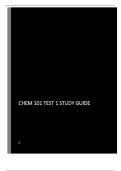
-
CHEM 101 EXAMS BUNDLE
- Package deal • 7 items • 2024
-
- $24.49
- + learn more
Exam (elaborations) CHEM 101 FINAL EXAM QUESTIONS AND ANSWERS 2 Exam (elaborations) CHEM 101 - EXAM 1 REVIEW CONCEPTS: CHAPTERS 1-4 3 OTHER CHEM 101 - Exam #1 Study Guide (Ch. 1-3) 4 OTHER Chemistry 101 Chapters 1-4 5 OTHER Chemistry 101 Chapters 1-2 6 OTHER CHEM 101 TEST 1 STUDY GUIDE 7 OTHER CHEMISTRY 101 UNIT 1
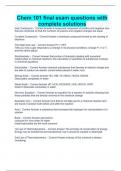
-
Chem 101 final exam questions with complete solutions
- Exam (elaborations) • 5 pages • 2024
-
- $8.49
- + learn more
Chem 101 final exam questions with complete solutions Ionic Compound - Correct Answer a compound composed of positive and negative ions that are combined so that the numbers of positive and negative charges are equal Covalent Compound - Correct Answer a chemical compound formed by the sharing of electrons The Ideal Gas Law - Correct Answer PV = nRT. Tells you how a gas responds to a change in its physical conditions. change P, V or T, and the others adjust Stoichiometry - Correct...
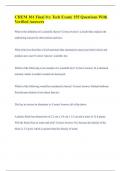
-
CHEM 101 Final Ivy Tech Exam| 155 Questions With Verified Answers
- Exam (elaborations) • 19 pages • 2023
- Available in package deal
-
- $14.39
- + learn more
CHEM 101 Final Ivy Tech Exam| 155 Questions With Verified Answers What is the definition of a scientific theory? Correct Answer: a model that explains the underlying reasons for observations and laws What term best describes a brief statement that summarizes many past observations and predicts new ones? Correct Answer: scientific law Which of the following is an example of a scientific law? Correct Answer: In a chemical reaction, matter is neither created nor destroyed. Which of the ...
![PACKAGE DEAL FOR STRAIGHTERLINE CHEMISTRY FINAL EXAM TEST WITH COMPLETE QUIZ[ANSWERED]PORTAGE LEARNING(CHEM 101;EXAMS,,DECKS:1-5)2023/24](/docpics/4069043/65845dc711e94_4069043_121_171.jpeg)
-
PACKAGE DEAL FOR STRAIGHTERLINE CHEMISTRY FINAL EXAM TEST WITH COMPLETE QUIZ[ANSWERED]PORTAGE LEARNING(CHEM 101;EXAMS,,DECKS:1-5)2023/24
- Package deal • 8 items • 2024
-
- $14.79
- + learn more
PACKAGE DEAL FOR STRAIGHTERLINE CHEMISTRY FINAL EXAM TEST WITH COMPLETE QUIZ[ANSWERED]PORTAGE LEARNING(CHEM 101;EXAMS,,DECKS:1-5)2023/24
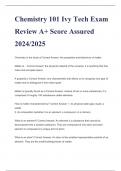
-
Package Deal For Chemistry 101 Midterm Ivy Tech Exams With Correct Answers
- Package deal • 6 items • 2023
-
- $16.99
- + learn more
CHEM 101 Final Ivy Tech Exam| 155 Questions With Verified Answers Chemistry 101 Midterm Ivy Tech (1-4) Exam With Correct Answers Chem 101 Ivy Tech (Final Review) Exam with Correct Answers Chem 101 Ivy Tech Midterm Exam| Questions with Correct Answers
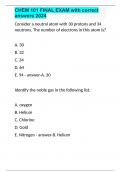
-
CHEM 101 FINAL EXAM with correct answers 2024
- Exam (elaborations) • 16 pages • 2024
-
- $7.99
- + learn more
Consider a neutral atom with 30 protons and 34 neutrons. The number of electrons in this atom is? A. 30 B. 32 C. 34 D. 64 E. 94 - answer-A. 30 Identify the noble gas in the following list. A. oxygen B. Helium C. Chlorine D. Gold E. Nitrogen - answer-B. Helium The formation of a gas resulting from the escape of high-energy particles from the surface of a liquid is known as. A. deposition B. evaporation C. melting D. Boiling E. sublimation - answer-B. Evaporation Wh...
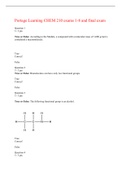
-
PORTAGE LEARNING CHEM 210 exams 1-8 and final exam
- Exam (elaborations) • 124 pages • 2023
-
- $28.99
- 5x sold
- + learn more
Portage Learning CHEM 210 exams 1-8 and final exam Question 1 3 / 3 pts True or False: According to the Module, a compound with a molecular mass of 1,000 g/mol is considered a macromolecule. True Correct! False Question 2 3 / 3 pts True or False: Biomolecules can have only two functional groups. True Correct! False Question 3 3 / 3 pts True or False: The following functional group is an alcohol. True Correct! False Question 4 3 / 3 pts True or False: In ...
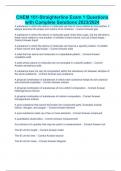
-
STRAIGHTERLINE CHEMISTRY Exam Bundle 2023/2024
- Package deal • 5 items • 2023
-
- $15.49
- + learn more
CHEM 101-Straighterline Exam 1 Questions with Complete Solutions 2023/2024/Straighterline Chemistry Final- deck 5/Straighterline Chemistry Final- deck 1 Questions with Correct Answers 2023/2024/Straighterline CHEM101 Final Exam Study Guide 2023/2024 Questions with Complete Solutions/STRAIGHTERLINE CHEMISTRY FINAL EXAM TEST WITH COMPLETE SOLUTIONS 2
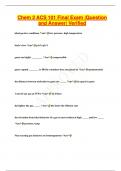
-
Chem 2 ACS 101 Final Exam |Question and Answer| Verified
- Exam (elaborations) • 12 pages • 2024
- Available in package deal
-
- $9.79
- + learn more
Chem 2 ACS 101 Final Exam |Question and Answer| Verified ideal gas law conditions *Ans* low pressure, high temperature boyle's law *Ans* p1v1=p2v2 gases are highly _________ *Ans* compressible gases expand ________ to fill the container they are placed in *Ans* spontaneously the distance between molecules in gases are _____ *Ans* far apart in gases 1 mol of any gas at STP is *Ans* 22.4 liters the lighter the gas, _____ *Ans* the faster the effusion rate the deviation from ideal behavi...
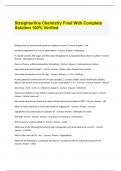
-
BUNDLED - ALL ABOUT STRAIGHTERLINE CHEMISTRY ; STRAIGHTERLINE CHEMISTRY FINAL EXAM,, Straighterline Chemistry Final- deck 1-5,,Straighterline Chem 101 Exam 1-4. Complete Package Deal latest 2023/2024 Guaranteed success!!!
- Package deal • 11 items • 2024
-
- $23.99
- + learn more
BUNDLED - ALL ABOUT STRAIGHTERLINE CHEMISTRY ; STRAIGHTERLINE CHEMISTRY FINAL EXAM,, Straighterline Chemistry Final- deck 1-5,,Straighterline Chem 101 Exam 1-4. Complete Package Deal latest 2023/2024 Guaranteed success!!!

Do you wonder why so many students wear nice clothes, have money to spare and enjoy tons of free time? Well, they sell on Stuvia! Imagine your study notes being downloaded a dozen times for $15 each. Every. Single. Day. Discover all about earning on Stuvia


